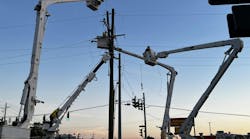Linemen often work in remote areas, in blazing hot and bitterly cold weather, and around high voltage. In the field, emergencies can happen, and when a lineman is injured or has a heart attack, crews need to be able to respond quickly to the emergency.
Case in point: during a cardiac arrest, seconds count, according to the American Heart Association. Ameren Illinois discovered this firsthand when one of its employees went into cardiac arrest at one of its operating facilities. The coworkers provided CPR until first responders arrived, and the coworker made a full recovery.
Fortunately, the operating center had an automatic external defibrillator (AED), as do many schools, community centers and parks. But because linemen are often on the road traveling from one job site to the next, Ameren Illinois wanted to find a way to protect its workforce in the field rather than just when they were stationed at the operating centers.
Ameren Illinois invested in AEDs for all of its line and natural gas crew trucks actively in use on a daily basis. Last year, Ameren Illinois vehicles logged more than 24 million miles. The utility focused on trucks that were used by more than one lineman since a victim cannot use an AED alone.
For the trucks with two or more coworkers, however, the AEDs could provide a life-saving benefit. As such, by the end of May, Ameren Illinois installed AEDs inside 239 crew trucks across its operating territory.
Researching AED Technology
Last summer, several line employees recommended that Ameren Illinois invest in AEDs. The utility created a team of about 16 coworkers to look at best practices and industry standards. As part of this investigation, Ameren Illinois examined why certain electric and gas companies were using a certain brand of AED. In addition, the team researched how the AED technology has evolved over the years. For example, linemen couldn’t leave their AEDs in their trucks in the wintertime because the cold weather negatively impacted the battery life.
To ensure that its new AEDs would function properly in an emergency situation, Ameren Illinois searched for an AED that could monitor the battery level. The new AEDs meet this requirement by indicating when the battery needs to be maintained or if the unit is malfunctioning.
Last December, the team made a proposal to the utility’s leadership. After deciding to go through with the investment, the utility had to then decide which AED to purchase and where to install them. In addition, the utility had to purchase decals for each truck to indicate an AED was inside.
Deploying AEDs
When deploying AEDs across a service territory, utilities not only must install the devices, but also train employees on how to use them properly.
At Ameren Illinois, all field workers are trained in CPR and First Aid, as well as how to operate an AED. The devices that the utility purchased are user-friendly and provide visual illustrations and verbal instructions to walk responders through the directions. That way, during stressful circumstances, the lineman know exactly how to turn on the unit, place the stickers, and do a count down before stepping back.
Within the trucks, Ameren Illinois installed the AEDs inside the cab of the truck. Sometimes they are located between the two seats, and in other vehicles, they may be in a different location. Regardless, the linemen know exactly where they are and how to access them.
So far, the line crews have not had to use them, but on any given work day, they know where they are. In addition, Ameren Illinois has alerted the local communities about the new AEDs. That way, when they see the utility’s white and green crew trucks with the decal on the side, they know an AED is inside. If linemen are working in a neighborhood where an emergency or cardiac arrest event occurs, residents will know that an Ameren Illinois crew is close by with an AED on hand and able to lend a helping hand.
By putting the AEDs in their trucks, however, the linemen are not considered first responders. Instead, the utility is focused on job safety and protecting its employees in the work place. Because of the majority of its workers are in the field, Ameren Illinois wanted to allow its linemen to work safely and bring them peace of mind in an emergency.
Karen Boulanger ([email protected]) is the director of safety for Ameren Illinois. She has been with the utility for 23 years, and in her current position, she strives to continuously improve the safety of the employees.


